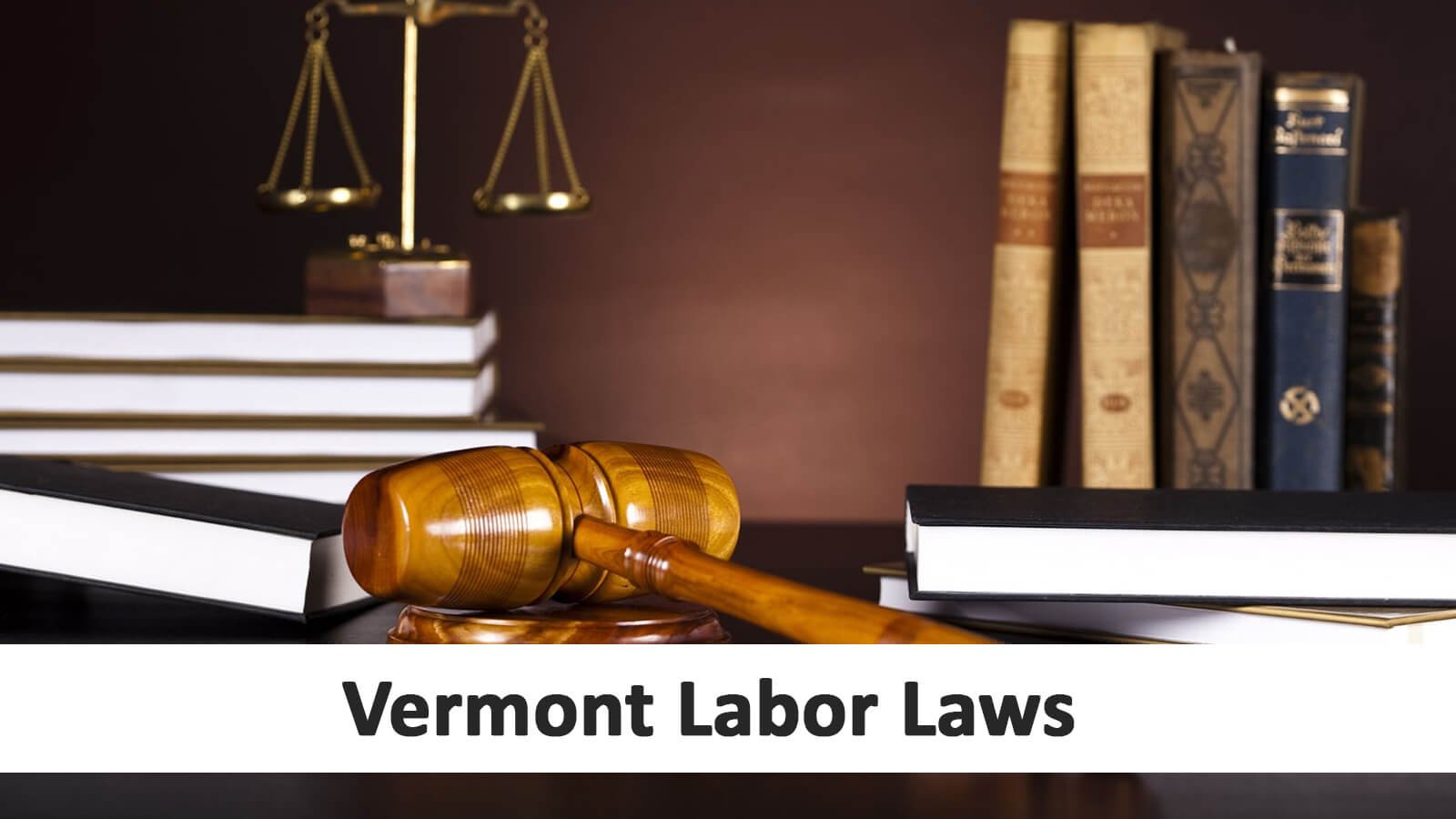Vermont labor laws aim to create an environment in the workplace that promotes fairness, safety, and anti-discrimination for all employees. Vermont goes further than many states by adopting policies that foster equality, fair pay, and work-life balance for its workforce.
Also check: “Now you can generate pay stubs by using our free paystub generator tool for any state in the USA, such as Vermont. Creating a paystub by using the pay stub template with our tool makes this earning statement compliant with the USA labor laws.”
Understanding the state of Vermont labor law 2025 is essential for both employers and employees. Check what the labor laws are in Vermont. Read this article to know more.
Standard Working Hours
Vermont considers full-time employment to mean working between 30 and 40 hours each week for independent contractors or self-employed professionals, although their hours may differ according to contract terms.
Minimum Wages
Effective January 1st, 2025, Vermont’s minimum wage increased from $13.67 per hour to a new rate of $14.01 an hour – well exceeding the federal minimum wage of $7.25 per hour and reflecting Vermont’s dedication to fair pay.
Overtime Pay
Vermont follows federal Fair Labor Standards Act (FLSA) guidelines when it comes to overtime pay; employees working more than 40 hours during any single workweek qualify for additional payment, as they should receive 1.5 times their regular hourly rate as overtime compensation for hours worked over 40.
Also Read: Labor Laws in Connecticut
Meal And Rest Breaks
Vermont labor laws do not contain detailed rules regularly. Instead, employers are expected to provide reasonable opportunities for workers to consume meals and use restroom facilities during shifts. Under the federal Fair Labor Standards Act (FLSA), short breaks lasting less than 20 minutes must be compensated, while unpaid meal breaks may be taken provided that all work duties have been released completely during that period of time.
Leave Laws
Labor laws in Vermont provide employees with various leave protections to enable them to fulfill important personal, medical, and civic responsibilities without jeopardising their jobs.
Beginning in 2025, Vermont will also expand its paid family leave program by permitting small employers with at least one employee to purchase coverage.
Under the Family and Medical Leave Act (FMLA) and Vermont’s Family and Medical Leave Insurance Program, eligible employees may take up to 12 weeks of unpaid leave for major life events.
| Leave Type | Description |
|---|---|
| Military Leave | Vermont employees who serve in either the National Guard or Reserve are entitled to take time off without penalty after serving, without losing employment benefits as a result of these laws. |
| Jury Duty Leave | Employees called to jury service are legally protected against termination by their employers; though paid leave for this purpose isn’t usually provided, time must be allowed off so the employee can fulfill his/her obligation. |
| Town Meeting Leave | Vermont recognizes the value of civic participation, permitting employees to take unpaid leave to attend annual town meetings without penalty. |
| Pregnancy Disability Leave | Under the Parental Leave Law, employees of businesses with 10 or more workers can take up to 12 weeks of unpaid leave due to pregnancy, childbirth or related short-term disabilities that prevent work for at least one year. |
| Paid Sick Leave (PSL) | Paid Sick Leave (PSL) in Vermont ensures employees can take time off without incurring income loss for health-related needs, without losing income in the process. Workers earn one hour of paid sick time for every 52 hours worked up to an annual maximum of 40 hours of PSL leave; it can be used for personal illness, caring for a sick family member, or safe leave due to domestic violence, sexual assault or stalking. |
Child Labor Laws
Vermont is known to have strict child labor laws designed to safeguard minors in the workplace.
Typically, Vermont’s minimum working age for minors is 14 years old with some exceptions:
- Working under 14 may include being employed by their parent/legal guardian,
- Engaging in newspaper delivery routes or working as actors or performers.
Minors under 16 must obtain an employment certificate before beginning work during school hours, unless it falls under an approved educational or vocational training program.
Employing 14 and 15 year-olds under strict conditions that limit both working hours and types of jobs:
- No work may take place prior to 7 a.m. or after 7 p.m. (extended to 9 p.m. between June 1 and Labor Day).
- Students could work up to 3 hours each school day and 18 hours every week during term weeks.
- During school breaks, they may work up to 8 hours per day and 40 hours per week (but no more than 6 days per week).
Young workers may work in office work, retail work, delivery of packages (without driving), cleaning and groundskeeping (excluding power tools ), food service, as well as gas station or car wash duties.
Due to safety considerations, certain industries and activities are strictly off limits for minors due to safety reasons. These regulations ensure Vermont minors can safely gain work experience while continuing their education and personal development.
Also Read: Rhode Island Labor Laws 2025
Employee Compensation
Vermont labor law mandates that most employers carry workers’ compensation insurance regardless of their business structure. This ensures employees will receive medical and wage replacement benefits should they become injured at work or become ill due to occupational activity.
Under Vermont state law, coverage is compulsory for:
- Nonprofit organizations (excluding churches ) with four or more employees for 20+ weeks per year.
- Employers with one or more employees working 20+ weeks annually.
- Employers paying $1,500 or more in gross wages in any quarter during either the current year or its predecessor year.
- Employers paying domestic workers over $1,000 annually.
Taxes In Vermont
Vermont offers individuals a state income tax rate ranging from 3.35% to 8.75% depending on the taxable income bracket.
Wondering how to create an accurate pay stub? – Check Stub Creator!
Creating accurate pay stubs is essential to both employers and employees, providing a clear record of earnings, deductions, taxes, and net pay. Businesses benefit from accurate pay stubs, as they facilitate compliance with state and federal labor laws while helping avoid payroll disputes and building trust with employees.
Manually creating pay stubs can be time-consuming and error-prone for small business owners or freelancers managing multiple payouts. A paystub generator free tool makes the entire process faster by automating features to calculate all details from gross income to taxes and deductions.
Stub Creator provides an effortless, fast, and accurate way to generate professional pay stubs in minutes by using an editable free pay stub template and tax calculations built in, assuring they meet state requirements while also including essential details.
Also read: Labor laws in Pennsylvania 2025
Curious Mind Also Asks:
1) What are the labor laws in Vermont?
Vermont labor laws address minimum wage, overtime pay, workplace safety issues, family and medical leave benefits and fair employment practices aimed at protecting employees’ rights. Employers must also abide by federal standards such as FLSA and FMLA compliance.
2) How often legally do workers get breaks in Vermont?
Vermont law mandates employers provide reasonable opportunities for employees to eat and use restroom facilities without being limited by specific break times and durations.
3) What state has $15 an hour minimum wage?
As of 2025, many states, such as California, Washington, and Massachusetts, all offer minimum wages of $15 or above per hour; Vermont offers only $14.01 an hour as minimum pay.
4) Is PTO mandatory in Vermont?
Vermont does not mandate general paid time off (PTO) policies, but does mandate paid sick leave under its Earned Sick Time law.
FAQ's
What is the minimum wage in Vermont 2026?
+
The 2026 Vermont minimum wage rate has yet to be officially announced; however, it's expected to increase slightly based on Vermont's inflation adjustment formula.
Are lunch breaks required in Vermont?
+
Employers should allow employees ample time for lunch breaks during their workday.
Are breaks required by law in Vermont?
+
Yes, Vermont law mandates ample opportunities for meals and restroom use during breaks of 20 minutes or less, while federal law mandates pay for breaks under this threshold.
Is 32 hours considered full time in Vermont?
+
Vermont employers generally consider 30-40 hours of weekly employment as full-time work, which adheres to federal Affordable Care Act standards.






